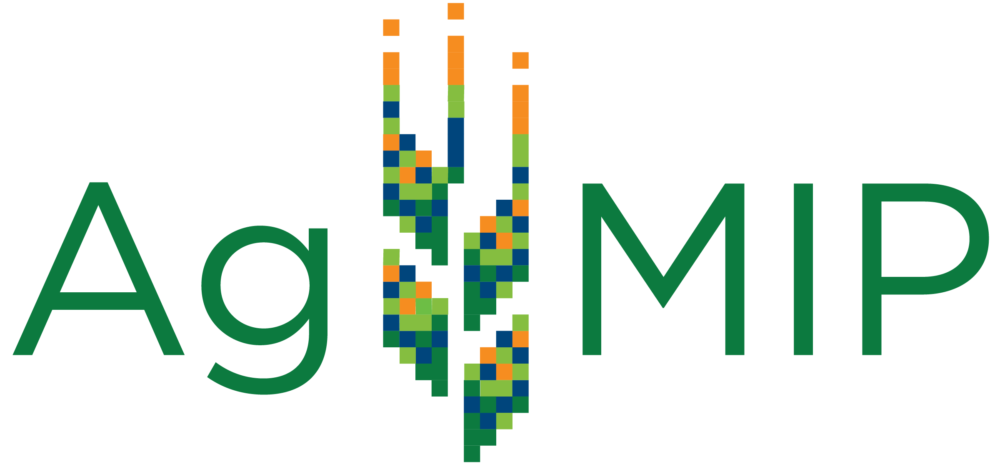Crop-Water Evapotranspiration Initiative
Overview
Soil water limitation and crop water deficit are major problems in most production regions, and will increasingly be affected by climate change factors and weather variability. Improving model processes related to water are of critical importance in the AgMIP model intercomparison and improvement project because crop water deficit is the outcome of uncertain predicted evapotranspiration and difficult-to-model root uptake of soil water, coupled to soil water infiltration, drainage, and soil water-holding traits. The methods of soil-root water uptake, crop transpiration, and soil evaporation tend to be repeated across different crops within a given modeling platform, but typically vary among modeling platforms. In addition, the effect of water deficit on growth, which in turn affects future water demand, is also treated differently by models.
Experience so far in AgMIP crop teams, indicates nearly two-fold variation among models in predicted evapotranspiration as well as large differences in predicted plant transpiration and soil evaporation. Present soil-crop models may be inadequate to account for within-season extreme events of temperature, evaporative demand, rainfall, or soil moisture, outside the normal weather/climate conditions under which most models are developed. Hence, there is a need to improve the temporal process understanding of soil-plant interaction responses to these extreme events, and how management practices modify the responses. Because the issues seem connected to model platforms and modules rather than crops, this initiative will not emphasize given crops, but will aim for data sets that have combinations of measured evapotranspiration, measured soil water balance, and measured in-season crop performance under soil water regimes ranging from fully irrigated to severely water-limited, and including extreme weather events.
These data sets will be used to intercompare, evaluate, and improve crop models for accurate prediction of soil water uptake (soil water balance), soil water evaporation, crop transpiration, crop evapotranspiration, and crop dry matter prediction under different soil water supplies ranging from fully irrigated to severely limiting soil water conditions in different evaporative demand and weather extremes with different soil traits. Improving crop models for response to water limitation is critically important for climate impact assessment, and for model use as decision support systems for producers, industry, researchers and policy makers and also as teaching tools/aids.
Goals
The goals of the Crop Water-ET initiative are to intercompare, evaluate, and improve crop models for accurate prediction of soil water uptake (soil water balance), soil water evaporation, crop transpiration, crop evapotranspiration, and crop dry matter accumulation under different soil water supplies ranging from fully irrigated to severely limiting soil water conditions under different evaporative demand and extreme weather environments with different soil traits. To the extent possible, the effort will be multi-model in nature to test model platforms as they presently exist. In addition, testing of different modules for ET or soil root water uptake will be evaluated within given platforms.
Objectives
- To identify and aggregate high-quality data sets on measured evapotranspiration (ET, hopefully E and T separately) with time:
- Lysimeter,
- Micrometeorological techniques (Bowen ratio, flux profile, eddy correlation), and
- Soil water balance (measurement method and frequency, knowledge of runoff-percolation)With Ancillary data on:
- Crop growth data (phenology, leaf area and biomass at different growth stages, yield)
- Soil profile description
- Meteorological data
- To conduct multi-model intercomparisons against data on ET, soil water balance, and water-limited crop growth.
- To evaluate individual modules for ET, E, T, soil water uptake, soil water balance, and water stress effects on growth within several existing model platforms.
- To recommend and document improvements in modules and parameters related to prediction of soil water evaporation, crop transpiration, soil water uptake, soil water balance, and water stress effects on plant growth.
- To recommend more standard methods for describing soil-water supplying traits of different soils, including rooting distributions and root water uptake.
- Produce multi-model assessment of relative water-limited production potential of various crops in various areas and land-types around the world, with and without improved modules.
- Produce multi-model assessment of the impacts of climate change on crop production, with and without improved modules.
Crops: Not crop-specific. However, the initial crop and order of crops studied will be determined according to availability of ET data. Most of the presently available ET data is for maize, thus, initial efforts will begin with AgMIP maize modelers and model platforms capable of simulating maize. Other crops, such as wheat will follow.
Potential List of Model Platforms (within which modules will be evaluated): DSSAT, APSIM, EPIC, RZWQM, CropSyst, etc.
Status: An initial organizational meeting of 45 interested persons was held November 2, 2014, in Long Beach, California during which plans were developed, protocols discussed, and available ET data sets described. Two actions were recommended:
1) multi-model testing of maize models against ET data sets on maize (led by Jerry Hatfield, contact jerry.hatfield@ars.usda.gov), and
2) testing of different modules for a process within model platforms against intermediate data sets on maize (led by Laj Ahuja, contact Laj.Ahuja@ARS.USDA.GOV). The AgMIP Water ET team will meet Feb 25-28 during the AgMIP Global Workshop, to establish the specific data sets to be used for these two activities as well as the protocols for blind and calibration phase testing.
To participate, register here to indicate your interest in modeling of, or providing data on ET or water-limited growth. Indicate the model, crops of interest, willingness to work with maize (as first crop), interest in testing modules within platforms (separate activity), and data that you are willing to share. Indicate if you will come to the AgMIP Global Workshop, February 25-28, 2015.
Co-leaders:
Laj Ahuja (Laj.Ahuja@ARS.USDA.GOV),
K. J. Boote (kjboote@ufl.edu), and
Jerry Hatfield (jerry.hatfield@ars.usda.gov)
